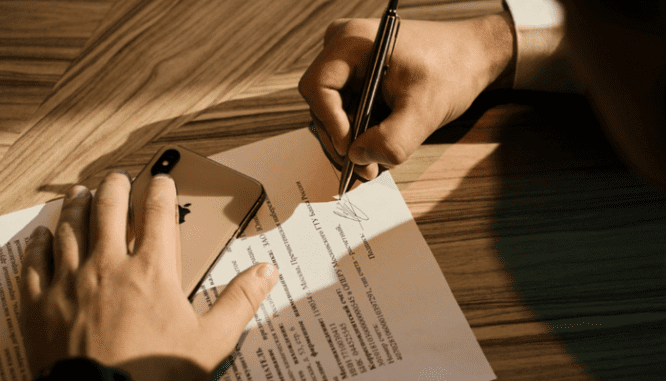 A couple and real estate agent signing mortgage documents." width="775" height="413" />
A couple and real estate agent signing mortgage documents." width="775" height="413" /> A couple and real estate agent signing mortgage documents." width="775" height="413" />
A couple and real estate agent signing mortgage documents." width="775" height="413" />
Sandy John is a freelance writer and editor who specializes in real estate, homeownership, and personal finance articles. Previously the real estate editor for The Atlanta-Journal Constitution, her byline has appeared in several national and regional publications. Sandy has purchased homes in four cities and she has lost track of how many DIY home-improvement projects she’s done.
When you apply for a mortgage, you’re essentially asking a bank to hand you hundreds of thousands of dollars with the promise to pay it back over the next 15 to 30 years. The bank will ask for a list of mortgage documents to prove you’ll be able to repay the loan. (Can you blame them?)
The list of mortgage documents you have to produce may vary, depending upon your financial situation and the lender’s policies.
After talking to lending experts and reading through federal regulations (saving you the boredom — you’re welcome!), we’ve come up with this simple list of mortgage documents you should have on hand when you apply.

Mortgage documents are the paperwork the lender will use to decide whether to approve your mortgage. They are documents proving your identity, how much income you earn, what assets you own, and what debts you’re responsible for repaying.
Together, these mortgage documents allow the lender to see if you have enough income to pay back the loan and determine whether you’re creditworthy.
If you have a job where you get a predictable salary, and you don’t have any blemishes on your credit, the list of mortgage documents is relatively short, according to Richie Helali, mortgage sales leader at HomeLight Home Loans.
However, if your income is less predictable because of overtime, commissions, or self-employment, you may have to produce more documentation. If your credit history is thin or indicates past problems, the lender may also require a longer list of mortgage documents.
All mortgage applicants will need these documents:
Depending on your financial situation, you may also need to provide:
If there are dings on your credit report, the lender may ask for:
If your credit history is thin, the lender may look for other documents showing you keep up with your bills, though many lenders will require you to beef up your credit before considering you for a loan. Other documents to prove credit history might include:
The lender will require a picture ID, such as a driver’s license, to confirm you’re who you say you are. This helps the bank prevent mortgage fraud and identity theft.
If you get a regular salary, the lender will want to see your paystub for the last month. If you get paid weekly, that would be the four most current paystubs. If you’re paid twice a month, the lender will need the two most recent stubs.
The lender will also ask for your last two W-2 forms. Your employer issues a W-2 form every year that shows how much you earned during the year, as well as the amount of taxes withheld.
If your income is less predictable — perhaps you also get bonuses or overtime — the lender requires more proof of income, Helali notes. To count that extra income toward your ability to pay a mortgage, the lender wants to see exactly what you’re getting in compensation, so you may have to submit two years of income tax returns.
The lender may have you fill out Form 4506-T (Request for Transcript of Tax Return) or have you scan and submit all your forms.
If you’re self-employed, the lender will want to see your tax forms, and they may also require you to provide a balance sheet or profit-and-loss statement for the current year. The information lets the lender determine if your income is dependable from year to year.
In some situations, the lender may ask for more proof of income, such as bank statements.
Some people have additional sources of income that they want to be considered in their mortgage application, and each requires its own kind of mortgage documents.
In addition to confirming you have a dependable source of income to cover the monthly mortgage payment, the lender wants to ensure you have adequate assets — or money in a checking, savings, or investment account, as most of us non-bankers say.
The lender is interested in your assets for two reasons:
Documents that prove your assets include:
If you’re buying a home, you may be able to use gift funds for some or all your down payment and closing costs. You can accept such a gift from a relative (whether you’re related by blood, marriage, or adoption) and from a fiancé or domestic partner.
You can’t accept any gift funds from anyone involved in the real estate transaction, including the builder, developer, or real estate agent.
If you are using gift money to help purchase your home, the lender will require a gift letter from whoever gave you the money. In the letter, the donor must
In addition to all the mortgage documents you submit, the lender will look at your credit report. In fact, it will pull your credit report from all three credit reporting agencies — Equifax, Experian, and TransUnion. You must sign a form giving the lender permission to access your information.
(As a smart homebuyer, you should check your credit reports long before you apply for a mortgage to make sure the information is accurate. Get a free copy of all three credit reports and take steps to correct any issues before you apply for a mortgage.)
One reason the mortgage lender wants to see your credit report is to learn about your debts. The lender will determine your debt-to-income (DTI) ratio to ensure you have enough income to pay back your debts once your new mortgage is added to the mix.
To determine your DTI, add up your minimum monthly payments for all the debts you owe, including student loans, car loans, and credit card repayments. Add your expected monthly mortgage payment to the total, then divide by your gross monthly income (what you earn before taxes and deductions).
Your DTI should be less than 45% for you to qualify for most mortgages, but some will allow up to 50%.
If you have any blemishes on your credit report, such as late payments, the lender may ask you for a letter of explanation. The lender wants to know what caused the problem and if it’s been resolved.
In your letter of explanation “explain what you need to explain in as few words as possible. Don’t over-disclose,” Helali advises. “If the lender wants more details, they will ask for more details.”
A lender has the right to ask about anything that’s in your report, Helali notes.
If there’s a bankruptcy or foreclosure in your credit report, you may have to submit:
If you don’t have much credit history, the lender can establish your credit history by finding three acceptable credit references. However, not every lender will be willing to help you with this, so you might need to do a bit of research and digging to find a lender who is. The history should include a mix of references, such as:
If you know you have a thin credit file, it’s a good idea to compile documents, such as a year’s worth of canceled rent checks, to show your rent payment history, and to gather together any copies of utility bills and cell phone bills.

The information on your credit report can stay there for a long time, but negative information eventually drops off. Bankruptcy can remain on your credit report for seven to 10 years, depending upon what kind of bankruptcy you filed, according to Experian.
A foreclosure also stays on your credit report for seven years, Equifax says.
Lenders are more interested in your recent credit picture when it comes to how you’ve paid your bills over the past two years. A strong record of paying bills on time and keeping your accounts in good standing for two years may show the lender you’re creditworthy.
Lenders generally review two years of employment and tax information to confirm that you have a consistent and dependable source of income that would allow you to make monthly mortgage payments.
When it comes to assets, lenders typically review two or three months of records. If there are large deposits on your accounts in that period, the lender may ask about the source of the money. They want to be sure that no one gave money to pay for the down payment unless you’ve claimed that gift and produced a gift letter.
Once you find the house you want to purchase, events move quickly, so it’s best to have your mortgage documents gathered and ready to go before then.
“At the bare minimum, buyers should make sure they have the documents or have access to the documents they need,” Helali says.
If it takes too long to get the required mortgage documents after you go to contract, you could delay the closing. Underwriters need all the documents in hand before they can approve the loan.
Use our checklist of mortgage documents at the top of this article and make sure you have what you need.
For pay stubs or W-2 forms, contact your company’s human resources department or payroll department. Your company may use a payroll service provider that can provide you with a log-in to your account to get what you need, Helali notes. (Companies sometimes change payroll providers in the middle of the year, so you may have to submit two W-2 forms for one year. Just let the underwriter know why you’re submitting more than one document.)
If you don’t keep copies of your tax returns, check with your accountant or tax preparer, who will have a copy. If you used online tax-preparation software, like TurboTax, you can log into your account and print copies.
If you have online access to your bank and investment accounts, you should be able to print or download any documents you need to prove assets.
If you need some of the less common mortgage documents, you may have to go to the source. For instance, if you need a copy of a divorce decree, contact the clerk of the court that had jurisdiction over the divorce.

Using a consistent naming system helps your lender (and you) keep track of the documents and saves time during the mortgage document review process, Helali says.
Header Image Source: (Krakenimages.com / Shutterstock)
At HomeLight, our vision is a world where every real estate transaction is simple, certain, and satisfying. Therefore, we promote strict editorial integrity in each of our posts.